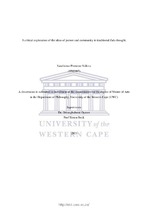A critical exploration of the ideas of person and community in traditional Zulu thought.
Abstract
The issue of personhood has long been of concern to many philosophers. The primary concern
has been about determining the necessary and sufficient conditions for an entity to be a person
at a particular point in time. The most common answer in Western terms is that to be a person
at a time is to have certain special mental properties such as psychological connectedness. On
the other hand, others argue that we can only ever understand the ascription of mental
characteristics as part of a necessarily joint set of physically instantiated properties. Most recent
contributions to the topic have however cast doubt on these earlier attempts to understand
personhood solely in terms of bodily and psychological features. Not only do they suggest a
model of personhood that is individualistic, they also fail to make reference to communal and
social elements. In particular, many non-Western, specifically African, cultures foreground
these communal and social aspects. This is true of the Akan, Yoruba and Igbo cultures. As
Kwasi Wiredu and Kwame Gyekye; Dismas Masolo; Segun Gbadegesin; and Ifeanyi Menkiti
have shown respectively. However, there is a lack of comparable philosophical inquiry in the
Southern African context. The primary aim of this study is to critically explore the
metaphysical, cultural, linguistic and normative resources of the Zulu people in understanding
what it means to be a person. The approach is predominantly conceptual and analytic, but it
also draws on some empirical data with a view to extending the results of the literature-based
study. Not only does this extend the field of cultural inquiry to personhood, it also opens up
new opportunities to tackle old problems in the debate, including the question of what should
be the proper relationship between the individual and the community. Specifically, I argue that
rather than focus attention on the priority of the individual or community in relation to each
other, consideration of the notion of personhood in Zulu culture reveals that notwithstanding
significant communal constraints forms of agency are available to individuals.
http://

